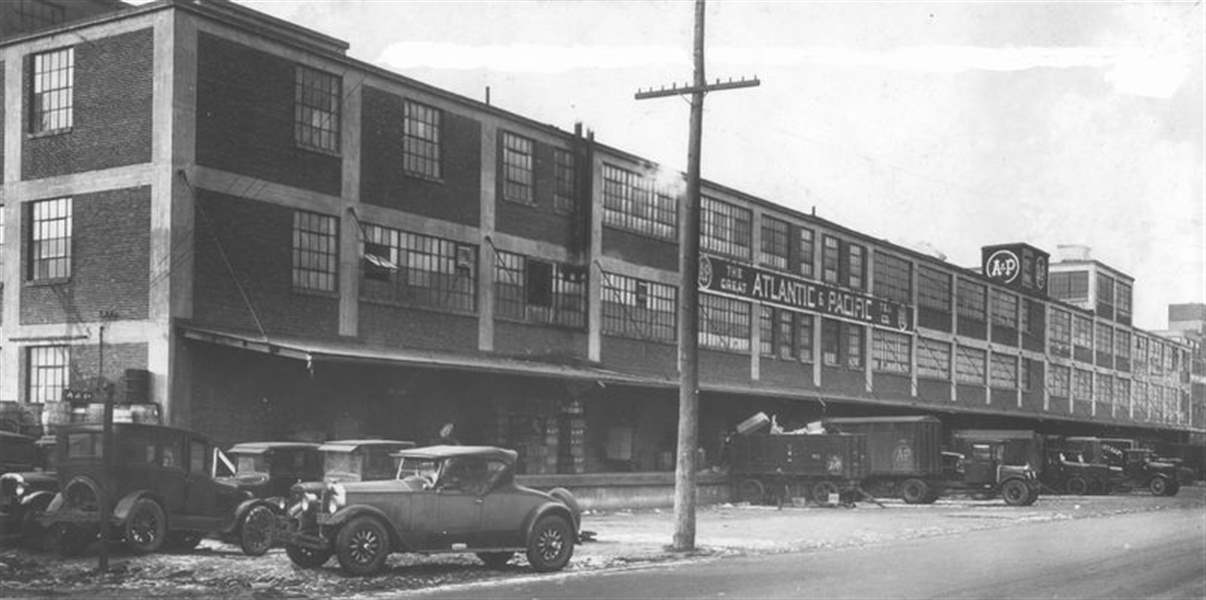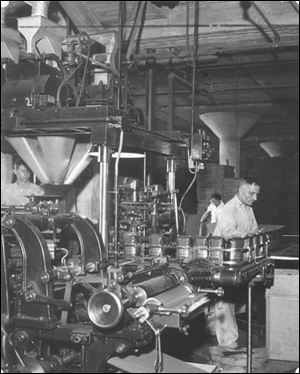
A&P was once a big deal in area's grocery business
12/5/2000
A&P warehouse on Brown Avenue underwent a big expansion in 1929.

A&P warehouse on Brown Avenue underwent a big expansion in 1929.
The Great Atlantic & Pacific Tea Co. is getting ready for its Toledo homecoming.
A&P is coming back into the Toledo market in an impressive way, with five stores right off the bat - two brand-new Farmer Jack stores under construction and three Churchill's Super Markets that will become part of the Farmer Jack chain, owned by A&P.
But many of the shoppers at the reconstituted Farmer Jack stores won't have a clue that A&P was once a giant in the Toledo area. Just before the Great Depression, A&P operated about 250 stores in its Toledo district, and at its high-water mark the chain had 15,700 stores nationwide - in an era when there was almost literally an A&P store on every corner.
From the 1920s to the 1970s, A&P operated mammoth warehouses in Toledo to serve its many area stores - first on Brown Avenue and later on Westwood Avenue.
By the time its Westwood facility opened its Westwood Avenue facility, its huge freezers could handle 15 million pounds of fresh meat annually.
And when it expanded in the mid-1960s A&P had 300,000 square feet of warehouses in Toledo. And as late as 1969, the chain still operated 72 fairly large stores out of its Toledo regional headquarters (covering parts of Michigan and Indiana), including 22 in the immediate Toledo area.
For seven decades, until two years ago, A&P also roasted its Eight O'Clock brand of coffee at its Brown Avenue plant.
Toledo was big for A&P in those days, and A&P was big for Toledo.
But when the downsizing started it happened quickly. A&P began closing stores in the area in the early 1970s and by 1975 its warehouses were shut. All of its operations, except for the coffee-roasting plant, were closed by 1983. Six years later, when it took over Farmer Jack, that chain's store lasted only another year.
Retiree Gerald Domschot, of Ottawa Lake, Mich., is among thousands of Toledo-area workers who got their first jobs at an A&P store.
“I enjoyed it, I really did,” said Mr. Domschot, who started as a bagboy at an A&P store at Reynolds Corners in the mid-1950s. He recalled his first attempt to bag groceries: “I put the eggs on top to keep them from breaking but they broke anyway.” In his 12 or so years at A&P stores, Mr. Domschot worked in nearly every department.
Mr. Domschot said employees often referred to A&P as “the grandmother of all supermarkets.”
And, indeed, it was.

Workers run machines to bag Eight O'Clock brand coffee in 1936; the Toledo roasting plant operated here until 1998.
A&P, founded by George Huntington Hartford, dates to 1859. Legend has it that Mr. Hartford, a native of Maine, bought a shipload of tea at dockside in New York City and sold tea directly to consumers at what was then a terrific discount. He soon opened a store in downtown Manhattan.
Within a few decades, A&P became the forerunner of modern chain stores - helped by the Chicago fire of 1871, as the chain became a recognizable name during reconstruction after the fire.
In 1912, one of Mr. Hartford's sons, John A. Hartford, created a prototype of the supermarket by opening a no-frills “cash-and-carry” store that did away with credit and home deliveries. By the 1930s, supermarkets led to the decline of the smaller stores.
By the late 1970s, A&P had fallen on hard times and sold a stake to German retailing giant Tengelmann Group, which now owns controlling interest. Although A&P recovered from its 1970s slump and now owns about 750 stores under 12 names in 16 states, its stock sagged recently to 15-year lows. Its shares closed yesterday at $8.13, compared to its 52-week high of $29.06, in New York Stock Exchange trading.
But A&P has a long history of rebounding from adversity and re-inventing itself to cope with changes in the food business. The chain has gone from an era of small corner stores to an era of sprawling supermarkets and 24-hour convenience stores. And it survived all of the changes.
Let's hope that A&P, in its third Toledo incarnation, will be around for a long time.
Homer Brickey is The Blade's senior business writer.